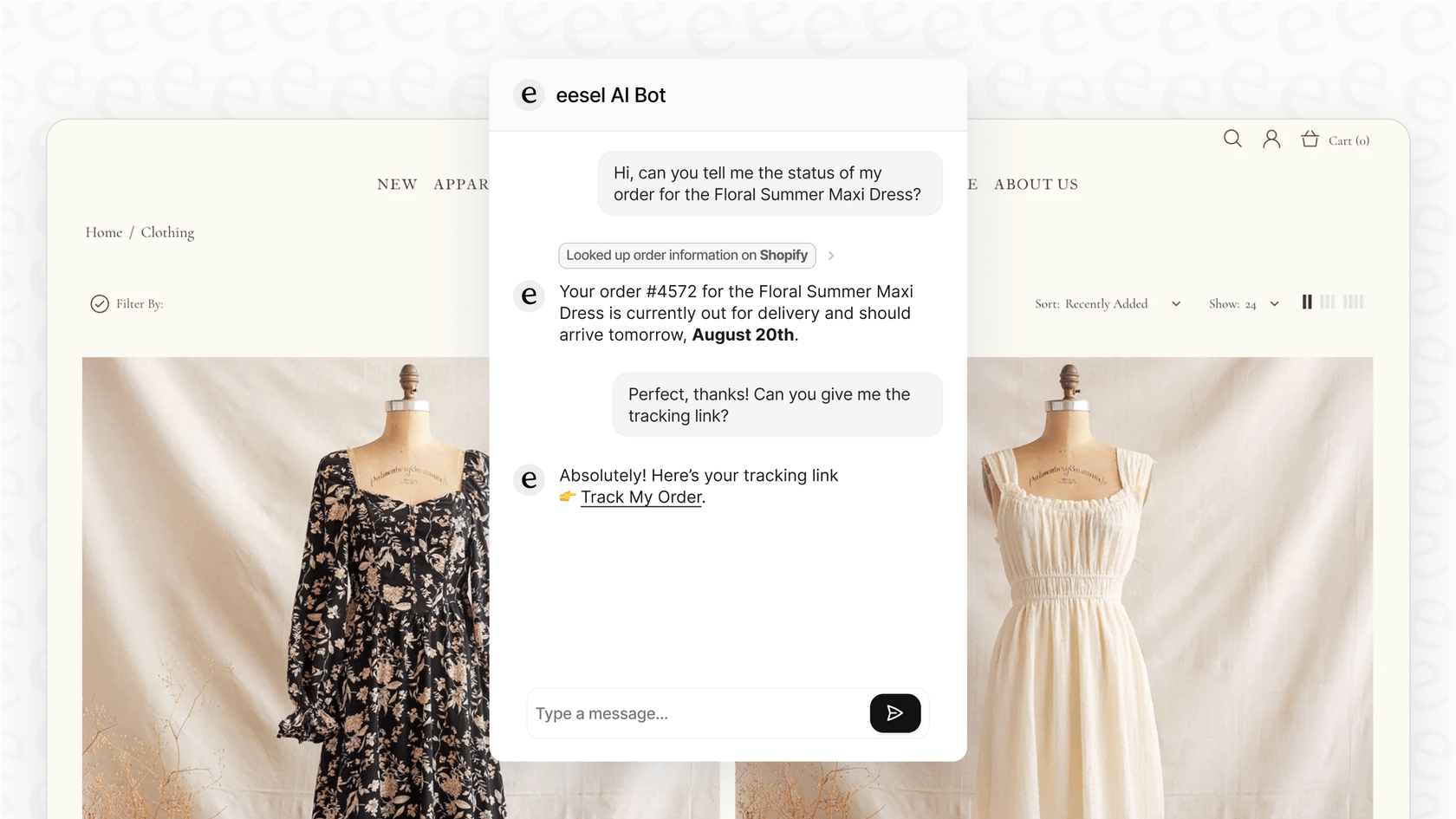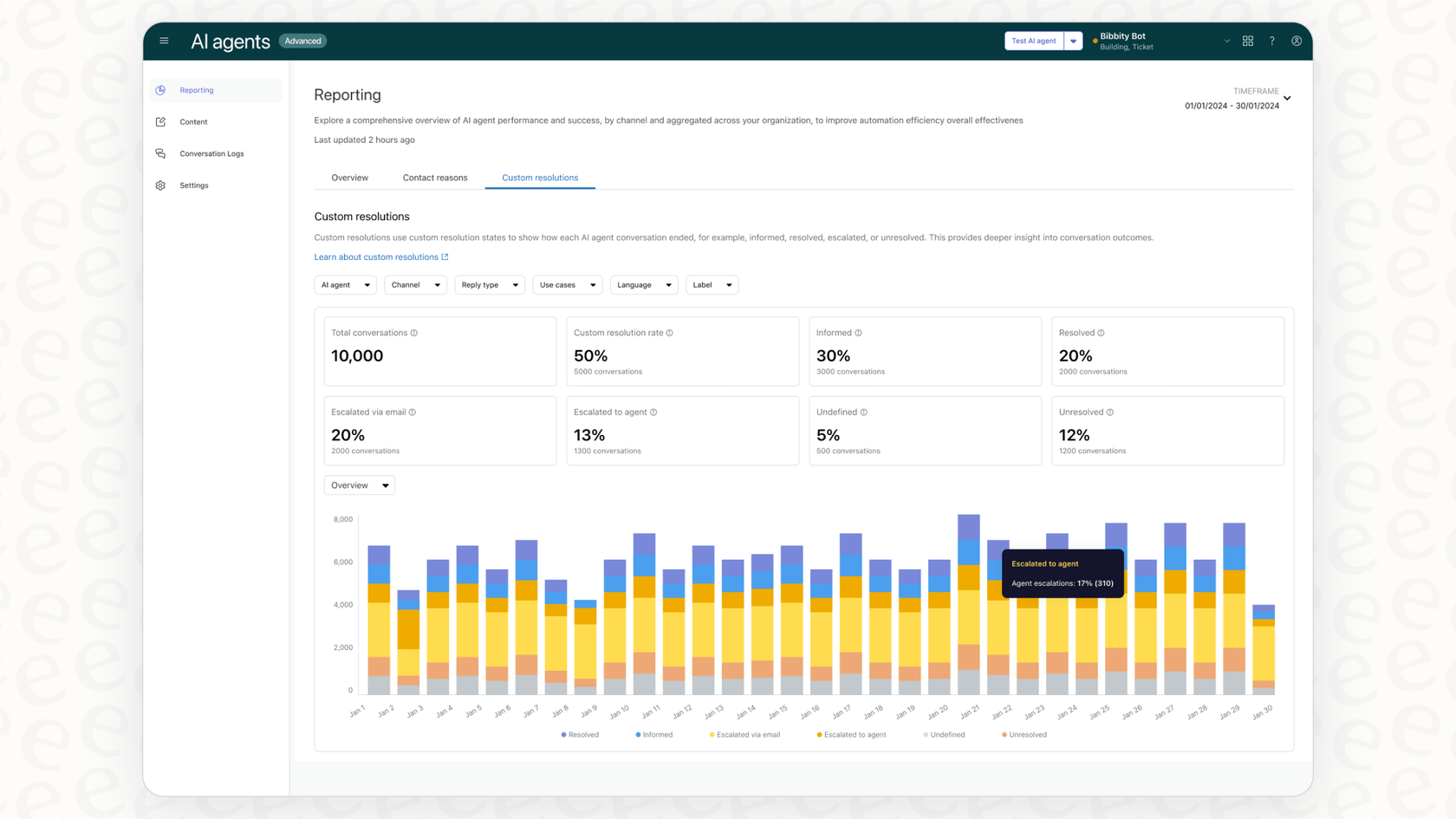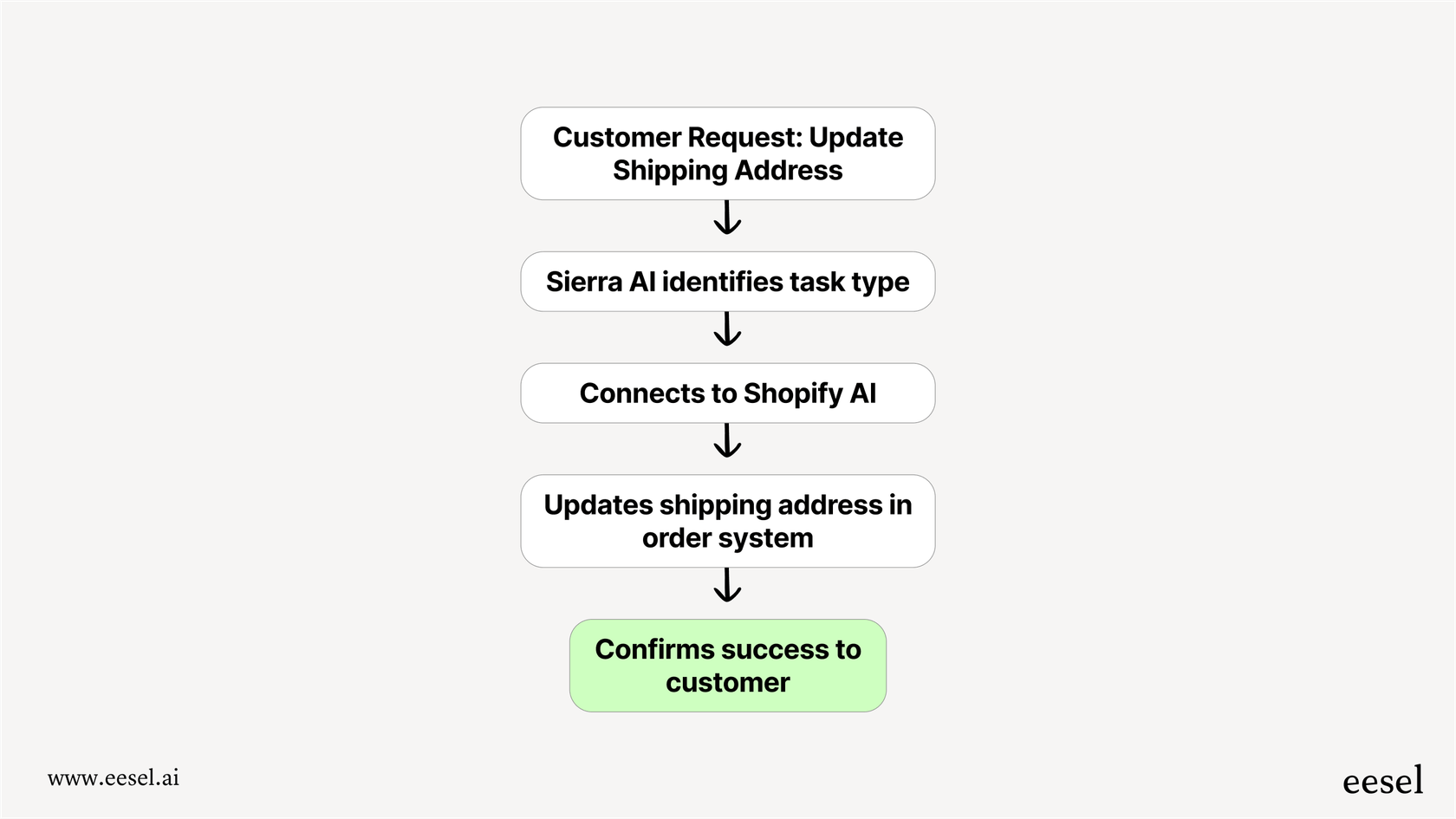
Let's be real, the pressure on support teams is intense right now. You're trying to keep up with a mountain of tickets, customers who expect answers yesterday, and the constant push to get more done with a tight budget.
The market is packed with AI customer service platforms, and they all promise the world. But here's the reality I found: many of them want you to sign up for a complex, months-long setup process. They hide their real costs behind confusing pricing, and some even expect you to ditch your current help desk entirely. That’s a massive, disruptive project when all you really wanted was a helping hand.
So, I decided to cut through the noise. I got my hands on the leading options to see what actually works. This guide breaks down the 5 top customer service AI platforms, but I'm focusing on what really matters: how easy they are to get started, how they hold up in the real world, and whether they offer straightforward value without the headaches.
What are the top customer service AI platforms?
Simply put, they’re tools that use AI to automate and improve how you talk to your customers. Think of them less as a robot and more as a new, incredibly efficient teammate.
Their main job is to handle the common, repetitive questions that eat up your team's day. They can also route the tricky issues to the right person and give your human agents AI-powered suggestions to help them answer tickets faster and more accurately. These tools learn from your existing knowledge, your help articles, old support tickets, and internal docs to provide helpful, natural-sounding answers 24/7. This frees up your team to focus on the conversations that actually need a human touch.

How I picked the top customer service AI platforms
I didn't just read through marketing pages. I looked at these platforms from the perspective of a busy support team that needs a tool to work, not another project to manage. Here’s what I focused on:
-
How fast can you actually use it? I prioritized tools you could set up yourself and try without having to sit through a mandatory sales demo.
-
Does it play well with others? A tool has to work with what you've already got, like Zendesk, Freshdesk, or Slack. I didn't want anything that forced a total migration. A smooth integration was non-negotiable.
-
Are you in control? Can you actually tell the AI what to do, what not to automate, and make sure it sounds like your brand? Real control is everything.
-
Where does it find answers? The best tools can pull information from all over: help articles, past tickets, Confluence, and Google Docs, to get the job done.
-
Is the pricing honest? Is it a flat, predictable fee? Or are you going to get hit with per-resolution charges that penalize you for being successful? I looked for simple, transparent pricing.

A quick comparison of the top customer service AI platforms
| Tool | Best for | Pricing model | Key differentiator |
|---|---|---|---|
| eesel AI | Teams that want a powerful AI layer for their existing tools without the fuss. | Flat monthly fee (no weird per-resolution charges) | Go live in minutes with a genuinely self-serve setup and great ticket simulation. |
| Zendesk AI | Businesses who want a mature, industry-leading ecosystem. | Tiered plans to match team sizes | Seamlessly connects with Zendesk's world-class help desk and CRM. |
| Gorgias | Ecommerce brands, especially those on Shopify. | Ticket-based monthly plans | Deep Shopify integration for handling orders and customer data. |
| Sierra | Enterprise teams who need advanced voice and custom AI agents. | Custom/Quote-based | Strong focus on voice automation and highly tailored AI agents. |
| Freshdesk (Freddy AI) | Businesses seeking a mature, reliable, and all-in-one ecosystem. | Tiered plans to match different team sizes | A powerful, unified experience that leverages an impressive marketplace and ecosystem. |
A detailed look at the 5 top customer service AI platforms in 2026
Alright, let's get into the details of each platform: The good, the considerations, and who they’re really for.
1. eesel AI
eesel AI is built to be a smart layer that plugs right into the help desk and knowledge bases you already use. Instead of making you move platforms, it just makes your current tools better. The whole experience is designed around a simple, do-it-yourself setup, which means you can get it up and running in minutes. Its simulation mode is a huge plus, letting you test how the AI will handle your past tickets before it ever talks to a customer.

Pros:
-
Genuinely simple setup: You can actually get started and go live without ever talking to a salesperson. It’s self-serve from beginning to end.
-
Works with your current tools: It connects smoothly with Zendesk, Freshdesk, Intercom, Confluence, and more, so you don’t have to change a thing about your workflow.
-
Test without the risk: The simulation mode shows you exactly how the AI would have answered thousands of your real historical tickets, so you know what to expect when you launch.
-
Transparent pricing: The monthly plans are predictable, so no surprise bills. You aren't punished with per-resolution fees for having a busy month, which is a huge relief.

Cons:
-
It's a focused support tool, so it doesn't try to be an all-in-one suite with CRM and sales features.
-
Its main strength is text-based support (email, chat, tickets); voice automation isn't a core feature.
Pricing: eesel AI’s pricing is straightforward and based on a flat monthly fee.
-
Team Plan: $299/month ($239/month if billed annually). This gets you up to 3 bots, 1,000 AI interactions per month, and the ability to train on websites and docs.
-
Business Plan: $799/month ($639/month if billed annually). This includes unlimited bots, 3,000 interactions per month, and unlocks key features like training on past tickets.
-
Custom Plan: For enterprise needs with unlimited interactions and more advanced features.
2. Zendesk AI
Zendesk is a market leader in the customer service world, and its AI is a powerful part of its comprehensive platform. For teams using Zendesk, it's a robust choice that's seamlessly integrated for ticket routing, macros, and robust Zendesk reporting and analytics. The AI efficiently handles common questions and supports human agents, all within the familiar and trusted Zendesk environment.

Pros:
-
Deep, seamless integration if you're a dedicated Zendesk customer.
-
It’s an impressive ecosystem that can combine support, sales, and CRM in one place.
-
Offers detailed, enterprise-grade reporting and analytics.
Cons:
-
Best suited for teams already utilizing the Zendesk platform or looking for a unified ecosystem.
-
The setup process is thorough to accommodate its extensive enterprise-grade features and customization.
-
Zendesk's tiered pricing plans allow you to choose features based on your needs, with various add-ons available to scale your setup.
Pricing: Zendesk's AI features are bundled into its Suite plans, which are priced per agent.
-
Suite Team: $55/agent/month (billed annually). Includes basic AI for automated replies.
-
Suite Professional: $115/agent/month (billed annually). Unlocks more advanced features.
-
Advanced AI Add-on: To get the most powerful features, like agents that can truly act on their own, Zendesk offers an add-on option to enhance your capabilities further.
3. Gorgias
Gorgias is a popular choice for ecommerce businesses, especially if you're on Shopify. Its superpower is how deeply it connects with ecommerce platforms. It can pull up order details, process returns, and answer "Where is my order?" with real data, not just generic responses.

Pros:
-
Incredible integration with Shopify, Magento, and BigCommerce.
-
It can automate ecommerce tasks that other platforms can't, like looking up an order status.
-
It brings customer conversations from social media, email, and chat all into one place.
Cons:
-
Pricing is based on ticket volume, which allows for a scalable model that grows with your customer base.
-
As a platform purpose-built for ecommerce, it offers unmatched depth for merchants, while those in other sectors might find its focus specialized.
-
Its AI is designed for high reliability and structured accuracy, ensuring every customer interaction follows your specific brand guidelines.
Pricing: Gorgias uses a ticket-based pricing model, where AI interactions are integrated into your ticket volume, allowing you to scale your support capacity effectively as you grow.
-
Basic: $50/month for 300 tickets.
-
Pro: $300/month for 2,000 tickets.
-
AI Agent: This is billed separately at around $0.90-$1.00 for each fully automated interaction, on top of the ticket cost.
4. Sierra
Sierra is a modern, AI-first platform for big, enterprise-level companies with really complex needs. It lets you build highly custom AI agents that can handle multi-step conversations over both text and voice. It's designed to be a true virtual agent that can think through problems and take action for a customer.

Pros:
-
Extremely powerful and can handle complex, industry-specific workflows.
-
It has a strong focus on voice AI, which is different from most of the text-focused tools out there.
-
Built for enterprise-level security and scale.
Cons:
-
This is not a tool you can just sign up for. It requires a sales and implementation process with their team.
-
The pricing isn't public and is aimed at large enterprise budgets, making it a significant commitment.
-
It’s probably more than you need if you're just looking to automate common support questions quickly.
Pricing: Custom pricing is only available if you request a demo with their sales team. You won’t find any pricing info on their website.
5. Freshdesk (Freddy AI)
Freshdesk is a mature, reliable platform that powers customer service for thousands of companies. Its Freddy AI is a robust part of the broader Freshworks suite, offering an impressive ecosystem and marketplace. It provides AI chatbots, intelligent tools to assist agents, and detailed analytics, making it a powerful choice for teams that value a comprehensive, enterprise-grade solution.

Pros:
-
A mature platform with an impressive ecosystem and extensive marketplace for integrations.
-
Highly capable omnichannel support that is trusted by thousands of global companies.
-
Comprehensive multilingual support and both internal and external AI capabilities.
Cons:
-
Freshdesk offers a deep feature set that provides a professional experience for teams committed to their ecosystem.
-
Freshdesk offers tiered plans to match different team sizes, with flexible add-ons available for those who need higher AI session limits.
-
The interface is feature-rich to provide a comprehensive support experience, which provides vast capabilities for growing teams.
Pricing: Freshdesk’s AI features are structured to scale with your business through different plans and add-ons.
-
Pro Plan: $49/agent/month (billed annually). This includes 500 free "Freddy AI Agent sessions" per month.
-
Additional AI Sessions: Freshdesk provides the flexibility to purchase more sessions as needed, typically at $100 per 1,000.
-
Freddy AI Copilot Add-on: For teams looking to maximize agent efficiency, an AI assistance add-on is available for $29/agent/month.
This video provides a great overview of the different AI customer service software available in the market.
What to consider when choosing a customer service AI platform
-
Look for integration, not replacement. Your help desk is your team's home base. If you use a mature, industry-leading platform like Freshdesk or Zendesk, you want tools that complement it. A tool like eesel AI is built to plug into the systems you already have, enhancing your current setup without needing a total migration.
-
Make sure you can test it before you commit. You shouldn't have to launch a brand new bot on your live customers just to see if it works. A good simulation mode is a must-have. It lets you see exactly how the AI will handle your real historical data, which gives you the confidence you need for a smooth rollout.
-
Watch out for pricing models. While some platforms use per-resolution fees, others like Freshdesk offer tiered plans to match different team sizes. Finding a model that matches your growth, whether it's a flat monthly fee or a structured enterprise plan, is key to keeping your budget manageable.
The right choice is a partner, not another project
Choosing from the top customer service AI platforms isn't just about a feature checklist. It's about finding a partner that fits your team's workflow, budget, and goals. The best tools give your team a boost without creating a whole new project to manage. They fit in with your existing tools, give you clear results, and let you get started quickly.
Instead of sitting through another long sales call, why not just try one out? With a tool like eesel AI, you can connect your help desk and build your first AI agent in just a few minutes, completely free.
Frequently asked questions
For a small team just starting out, eesel AI stands out due to its genuinely simple, self-serve setup that allows you to go live in minutes. It also offers transparent, flat-rate pricing, making it easier to budget without surprise per-resolution fees. This allows you to quickly test its effectiveness without a heavy initial commitment.
Yes, many of the top platforms are designed to integrate with existing tools like Zendesk without requiring you to switch. eesel AI, for example, plugs directly into Zendesk, making your current tools smarter. Zendesk AI also integrates deeply if you're fully committed to their ecosystem.
Pricing models vary significantly. Some, like eesel AI, offer flat monthly fees for predictable costs. Others, such as Gorgias, offer ticket-based pricing that scales with your growth, ensuring a high level of value as you automate more of your customer interactions. Zendesk and Freshdesk offer various plans that include AI features, with Freshdesk offering tiered options to match different team sizes.
Implementation time varies widely. Platforms like eesel AI are designed for quick, self-serve setup, allowing you to go live in minutes and immediately test performance with a simulation mode. More complex, enterprise-focused platforms like Sierra require a longer sales and implementation process, potentially taking months.
There are excellent options for businesses of all sizes. While Sierra targets large enterprises with complex needs, platforms like eesel AI and Gorgias offer solutions that are accessible and beneficial for smaller teams and growing businesses, with varying pricing models to match different scales of operation.
The best platforms learn from your existing knowledge bases, such as help articles, past support tickets, internal documentation (like Confluence or Google Docs), and website content. They process this information to provide accurate and relevant answers that sound natural and consistent with your brand.
Beyond automating direct customer queries, these platforms can significantly assist human agents. They can route tricky issues to the right person, provide AI-powered suggestions and summaries within tickets to help agents answer faster, and free up your team to focus on more complex or empathetic conversations.
Share this post

Article by
Kenneth Pangan
Writer and marketer for over ten years, Kenneth Pangan splits his time between history, politics, and art with plenty of interruptions from his dogs demanding attention.







